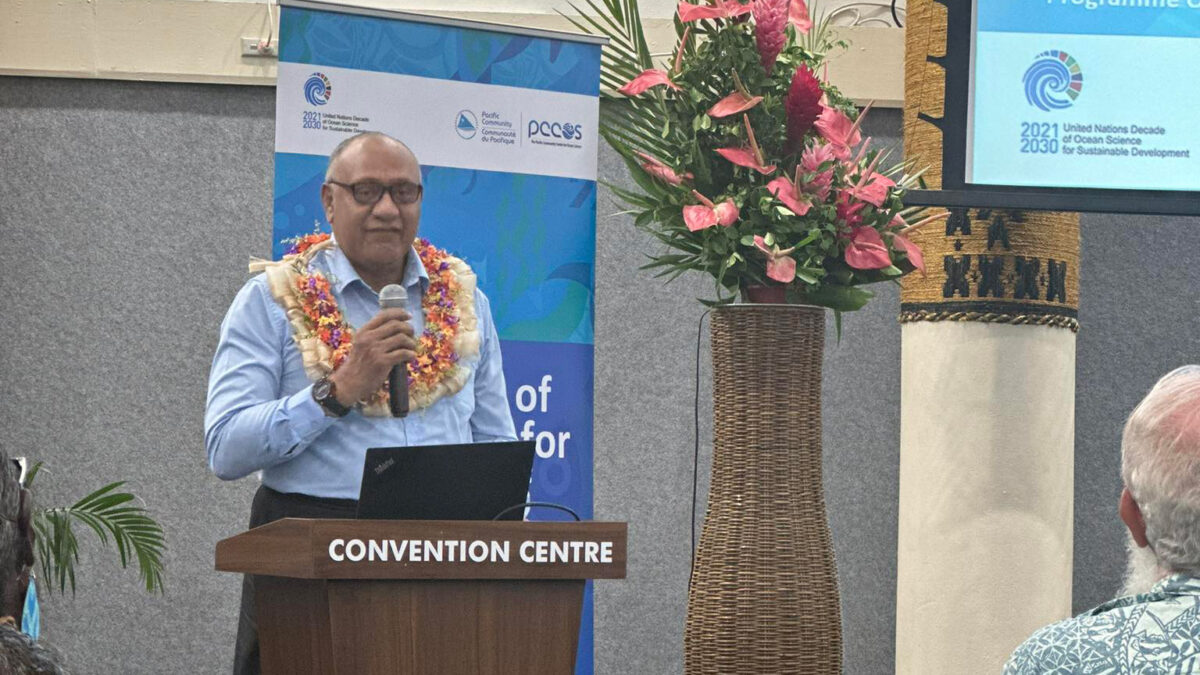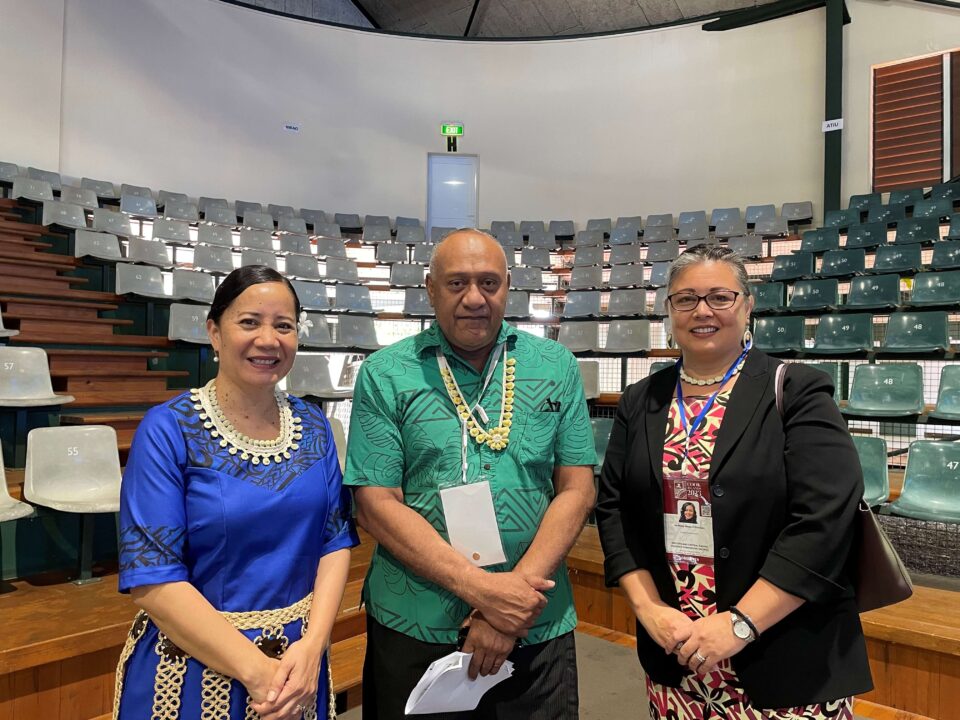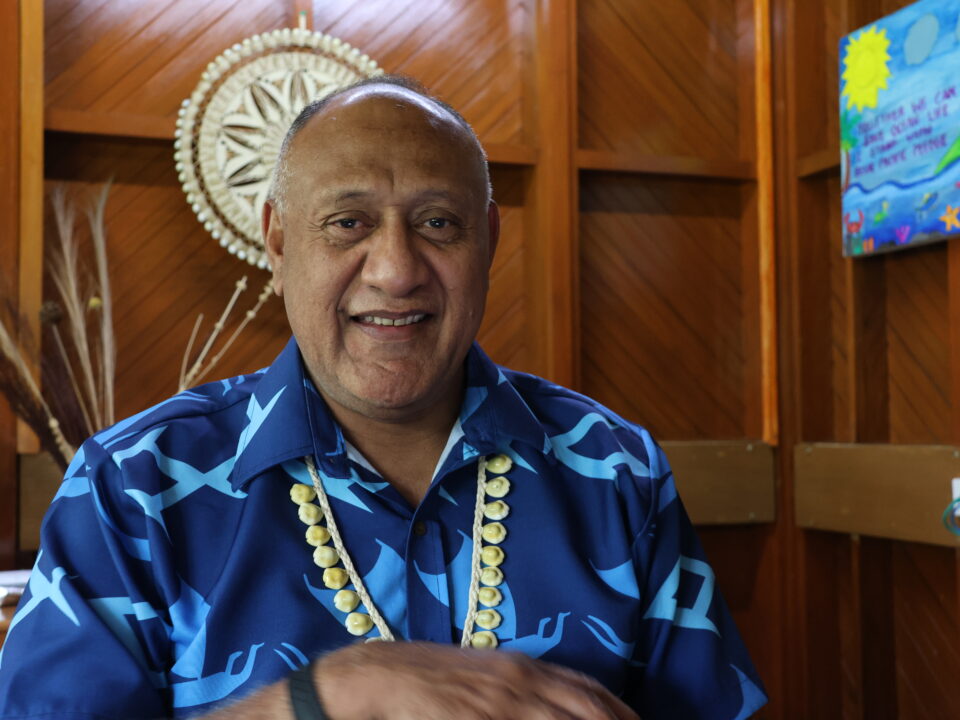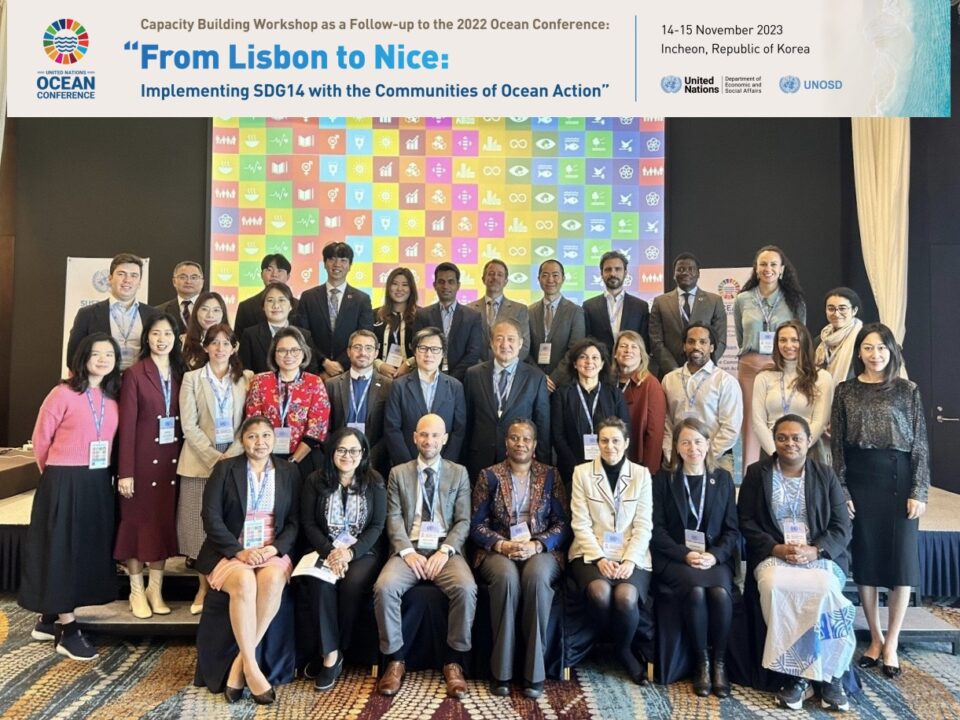
Pacific Islands Conference on Ocean Science and Ocean Management
11 September 2023, Nadi, Fiji
Remarks by the Pacific Ocean Commissioner, Dr. Filimon Manoni
Excellencies, Member Government Representatives, CROP Colleagues, Representatives of our valued Ocean Stakeholder Groups,
Iakwe! Bula Vinaka! Gut pla dei Olgeta!
Firstly, congratulations to Fiji and we convey our best wishes to the remaining Pacific Teams represented at the rugby world cup. I’m sure that will make us all proud of the region we come from. Now moving on to what lay ahead of us this week. I hope we can all make full use of this opportunity.
Let me begin by thanking the SPC Director General, Mr Stuart Minchin, Deputy Director General, and a good friend, Dr Paula Vivili and the Team at SPC for bringing us all together, and for this opportunity to provide some brief remarks at this important Conference.
I’m sure we are excited for the conversations in the coming few days. Looking at the programme, we have an exciting time ahead. As you consider the important issues of science and management, I’m reminded that these are all key aspects that will help deliver the 2050 Strategy for the Blue Pacific Continent.
For those that may not be aware, the 2050 Strategy provides the regions long-term political vision and strategic direction for the next 3 decades. The vision is clear, and I quote – As Pacific Leaders, our vision is for a resilient Pacific Region of peace, harmony, security, social inclusion and prosperity, that ensures all Pacific peoples can lead free, healthy and productive lives. From my point of view as Ocean Commissioner, this Strategy can shape and provide a point of coherence in the Ocean space that we all wish to leverage for the betterment of our Pacific peoples.
In addition to the important issues of science and management, I also think that the critical elements of strong leadership, and governance provide the other critical ingredients or elements for the effective management of our ocean. Strong leadership and governance and back by sound policy, science and traditional knowledge are key ingredients for us moving forward. They must all work together. In the past, it has always been difficult to always consider these elements together. This is because, they are dealt with separately in different fora. Perhaps this is an area that we must bring together in the future. To provide further emphasis on these issues, allow me to use an analogy.
Since it is the rugby world cup season, let us draw from this. Our rugby and football teams, like any other sport will have their team management, coaches, that support the teams’ preparations. that provide the guidance to the team Members. On the field, the teams are led by the captain that provide the leadership. In times of trials and hardships, the captains have a large role to play in a team’s interest. Let us draw on this analogy and the importance of leadership. Imagine a team where there is no captain. A captain leads in a trustworthy and respectful manner with aim or destination clearly in sight.
To contextualise this back to our Blue Pacific Ocean, strong leadership means leading the direction of our canoe, vaka or drua. As our Leaders have charted our destination with the 2050 Strategy firmly in sight, we all have a role to play. Let me move to the different aspects of the vaka.
Within our vaka, there are governance systems and hierarchy from the captain of the vaka, right down to the ordinary sailors. The vaka has a system to make its decisions and address issues. This depicts the importance of governance systems at the various levels and like the vaka, each and everyone of us have an important role to play.
Our Blue Pacific Ocean is a crowded space – it has become a space of strategic interest for us and for others. We must have a clear direction on our different roles and responsibilities. But our Pacific Ocean covers 20 percent of the globes surface, the healthiest tuna fishery in the world and untapped ocean resources. This is driving interest from international, regional, and national actors covering Governments, civil society, private sector and private interests. But how do we manage all these interests to maximise opportunities in a sustainable and risk-informed manner whilst also mitigating the common challenges to our ocean?
Moving on to our vaka, there are inbuilt customary practices of how things are done, where our morals, values and traditions come into play. These for me, depicts the policies to ensure practicality and traditional knowledge and science is what makes the journey trustworthy for the Captain of the Vaka. Understanding the elements. The traditional signs of bad weather and storm, allows the Captain of the Vaka to manoeuvre and steer clear of bad weather. This depicts the important role of contemporary science or traditional science also known as traditional knowledge. The Leaders who jointly captain the vaka will need to be informed of the science and what is expected to come our way in this journey. What measures will need to be in place and when. This highlights the important issue of decision making, firmly based on the sciences for decision and policy making. This would be considered by some as the science-policy interface that I feel needs to be strengthened in or region. Once the destination is charted by our leaders, what should immediately follow is the sciences, that should in turn inform the policy decisions. Bearing, in mind that at times, we will need to find the right spot for anchorage to review and reflect. To await the strong winds, mend our masts, before continuing the journey.
Excellencies, Ladies and Gentlemen,
No doubt the journey towards 2050 will be a long one for our vaka. It will be where generations will be required to take on the leadership and captaincy roles and take charge of the oar. We often hear, that as a region, we are in one ocean but different vakas. The way I see it, we have one ocean, and one vaka that has set sail for the 2050 Strategy of the Blue Pacific.
My message to you today is, there are different aspects of the vaka that I have described to you, leadership, governance, policy and contemporary science and traditional science or traditional knowledge. But all these exist in that one vaka that we are relying on to make it to the final destination. I want us all to see all these aspects from this vantage point. We are part of this one common vehicle and each of our specific demarcated roles, connected to one another to make the journey towards 2050 a seamless one.
So I encourage us that this week, to avoid looking at the issues of science and management in their very own isolated ways. They are and should be part of the broader picture that will enable us to identify that if there is an issue in our common vaka, that we must address them systemically and through the same lense. The solutions take into account how it affects other aspects as well of the same vaka.
Last week, I was in PNG for the Pacific Tuna Forum. I was amazed at how all stakeholders came together and were very willing to come together and to share and information and cooperate with one another. My key take aways from that Forum was, the how the issues of sustainability, climate change, IUU, technology, economic models, market access and cooperation as important aspects that are crucial for the future of our fisheries. As the Secretary General of the Forum, Henry Puna put it in his remarks at the Forum. Our fisheries is our blue gold.
Since taking up the Commissioner’s role on 1 August. Three weeks into my role, I convened a Regional Ocean Policy and Governance Dialogue from 21 – 24 August. I see many familiar faces from that Dialogue also present at this meeting. You are a the catalysts of what I have been highlighting. You have the opportunity to inspire the discussions and to ensure that we envision that vaka as encapsulating all the different aspects of Leadership, governance, policy and science.
At the OPOC Dialogue, we learnt that there are policies and associated governance frameworks and mechanisms being developed at national, regional and global levels. From the Talanoa held, it was clear that there were no clear structural connections between these policies and governance frameworks. I believe to be effective; we must show leadership for our Ocean space to ensure coherence and alignment on agreed policy priorities – in particular, at the regional and national level to then inform how we show leadership and engage with global ocean mechanisms and frameworks. There was a call for more science and capacities. We of course look to SPC, USP, SPREP, FFA and other regional organizations and POA Members for the enhancement of science.
How can we turn the table and provide the building blocks and with the support from our partners, become the leading science providers on our ocean?
How can we maximize on the UN Ocean Science Decade to make a marked improvement of science in our region?
These are questions I put to you and one that I hope this meeting can consider and provide some clarity around. As Pacific Ocean Commissioner, it is my endeavour to solicit from Forum Leaders their commitment to be more involved and to provide the leadership that is needed and that our ocean desperately needs.
Excellencies, Ladies and Gentlemen
Allow me to end by reiterating what previous Ocean Commissioner, Dame Meg Taylor likes to use the infamous African proverb. If you want to go fast, go alone. If you want to go far, go together. I have full confidence that the next few days will be a success not only for participants here, but also for the region as a whole. I wish you all well in your discussions.
Thank you all very much for your attention.



